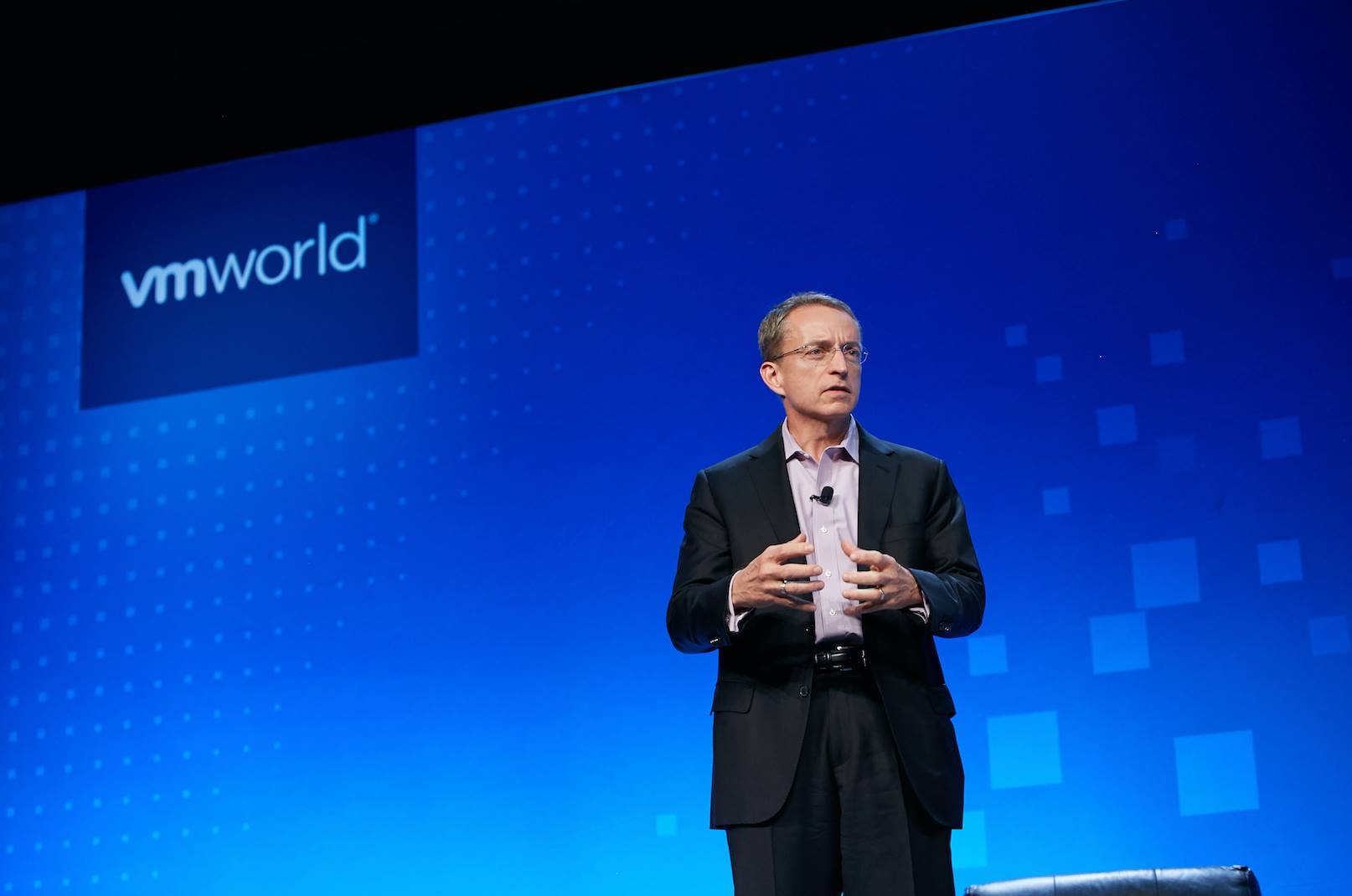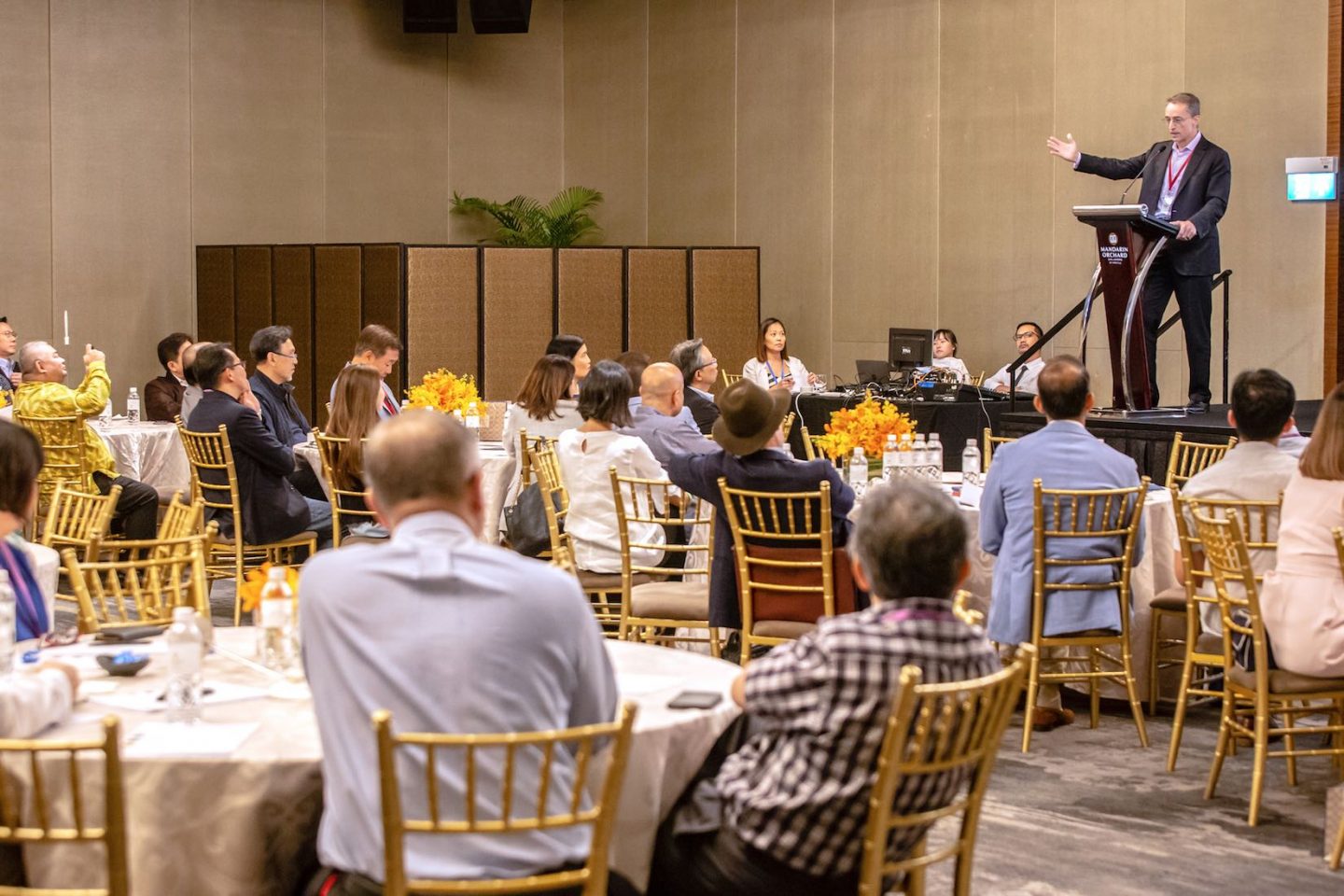“I’m the senior pastor of the church of VMware”: CEO Pat Gelsinger
by Jane Lee // November 27, 2019, 11:58 pm

Pat Gelsinger leads a 30,000-strong company that specialises in virtualisation software and he sees the employees as his flock. Photo from VMware Facebook page.
Patrick Gelsinger, who was ranked the best CEO in the US, always thought he was going to be a farmer.
Being the oldest son, the CEO of Silicon Valley software maker VMware would have inherited his father’s farm. But his father, being the ninth of 10 children, ended up working on his siblings’ farms instead.
“My dad never had his own farm. If he did, I’d be a farmer in Pennsylvania today,” said Gelsinger, drawing much laughter from an appreciative crowd of 180 at the Leadership Summit 360 organised by international non-profit Family First Global.
“These are the people I’ve been called to be responsible for.”
An “accidental” scholarship set him on what he called a “Cinderella career” where he helped to create the technology behind USB, Wi-Fi and PC chips, rather apt for someone whose career goal as a 25-year-old was to work on a piece of technology that would touch every human on the planet.
Highly regarded by both industry peers and his staff, the 58-year-old was rated the top CEO in America by employees in an annual survey by employment website Glassdoor earlier this year.
Hot for God
At 18, when Gelsinger moved to California after being recruited by Intel Corp., he went to church to “meet girls” but found God – and his wife.
Although he grew up in a church setting, there was something in the sermon that spoke to him. “I made a decision that day to become a full-time Christian and to live hot for God,” he explained, referencing Revelation 3:15-16.
His career goal at 25 was to work on a piece of technology that would touch every human on the planet.
A few months later, he felt called to become a minister but he was in love with technology. As he wrestled with God, just as he finally gave in and said he would leave technology to go to seminary, he had an answer from God – the workplace is your ministry.
“I like to say I’m the senior pastor of the church of VMware,” Gelsinger quipped. The company, which specialises in virtualisation software, has about 30,000 employees.
A pastor from the San Francisco Bay area once ribbed him: “Pat, if I paid my congregants as much as you paid yours, I’d have more show up too.”
To Gelsinger, the employees are his flock and he sees his job as a “sacred” calling: “These are the people I’ve been called to be responsible for. I’m given the opportunity to be influential in their lives, their community, their families. And we do spend more of our discretionary time with our work families than our personal families.”
Most precious resource
By the time he was 30, Gelsinger had accomplished all his goals. He was the youngest vice president at Intel Corp., he got his first patent and even published his first book.
It was during his struggle to figure out what he wanted to do with the rest of his life that he realised the most important resource he had was time: “God gives us all the same amount every day. We start with the same allocation. What are you going to allocate your most precious resource to for the rest of your life?”

Pat spoke on “Maximising Your Leadership Effectiveness” during the Leadership Summit 360. Other speakers included former US Ambassador Gregory W. Slayton and Thio Gim Hock, CEO and group managing director of OUE. Photo courtesy of Family First Global.
To this day, he conducts annual “time studies” to see if he’s utilising his time based on his life’s mission statement.
“If it’s not on your mission statement, then the God-honouring thing to do is to say ‘No’. But if it’s on your mission statement, then you pour yourself into accomplishing those goals and you live that way – every single day,” he mused.
“If you’re not disciplined with your most important resource, then any path would be okay. How much more of work do you want to do? Is this what your priorities and goals are for life?”
Keeping score
The father of four – and grandfather of seven – applies the same logic in his family life. In fact, he and his wife “keep score” on the amount of time he spends at home. If he’s home by 6pm, he gets one point. If he’s back by 5pm, it’s two points. If it’s after 6pm, it’s zero. And if he’s gone weekends, it’s negative points.
His secretary would track the timings and send a chart to him and his wife every month. They now have 30 years’ worth of these charts.
“We have the mean, the skew, the median, we’ve got it all to keep score,” he joked. “I’m a goal-oriented guy. But this is living by your priorities.”
“You may not need vacation but your family needs you on vacation.”
He also revealed that in the first 10 years of their marriage, he didn’t take any leave.
“Why would I take vacation? I like working, why would I stop working?” he added. But his wife told him: “You may not need vacation but your family needs you on vacation.” The proverbial penny dropped and he’s been taking holidays with them since then.
Gelsinger also made it a point to have dates with each of his children while they were growing up. Every week, he’d take one of them out for breakfast before going to school. Over 30 years later and now that they are aged 29, 31, 33, 36, Gelsinger said he still takes them out for breakfast.
“When you go through the teenage years, and they’re not sure if they want to hang out with you, habits like these matter in the relationship,” he added.
How to be a CEO
After God and family, Gelsinger’s third priority is work and he believes that Christians should be the best employees because “the most God-honouring thing we can do is be excellent in the workplace”. Yet he cautions that it doesn’t necessarily mean we’ll always be successful or get promoted.
To encourage those at the leadership summit, Gelsinger told a story of how he got passed over for a promotion that he felt he deserved. Yet that year of humility was one of the best years of his personal growth, he recalled.
He also gave six leadership principles for CEOs gleaned from his own journey.
1. Values
“Values is the most enduring, lasting and important thing a leader will do for the company. Products come and go, strategies will change. Values need to the essence of who the company is, representing the soul of who the business is. What are the values that you’re representing as a business leader?”
2. Wise mentors
“We’re diamonds in the rough and you need people to knock the rough edges off, to expose the facets of God’s beautiful diamond He created in you. Without mentors in your life, you won’t become all that God created you to be.
“Andy Grove, a famous leader in Silicon Valley, was my mentor for 35 years. Mentoring with him was like going to the dentist and not getting Novocaine – if you were 95% right, you were wrong. He was tough, he was hard, and he made me better.”
3. Wise as serpents
“Many of the decisions you’ll make as leaders are now being scrutinised by tens, hundreds, thousands or, potentially in an online social world, everyone. You need to be wise as serpents as you go through this journey of leadership and this is where your mentors become very appropriate.”
4. Your most important hire: HR
“If you want to build a values-based company and you want someone to protect and build that culture of the organisation, your head of HR is your most important hire as a CEO, not the head of product or head of sales. In a technology and digital world, your most important asset is your people.”
5. Your flock
“If you think of your employees like employees, you have failed. You need to think of them as your flock. What does a senior pastor do? They worry about the people, their physical health, their spiritual health, the health of their family, the health of their communities. It’s a sovereign responsibility you’ve taken on as a leader.”
6. Your social responsibility
“Your first job as a CEO is to build a successful company. If you’re not profitable, you can’t do anything else. But if you have a great business, then you have the responsibility to do everything else with regard to the community, the climate and every other thing that the society is looking at us business leaders to do. That’s about creating an objective bigger than the success of the company.”
“Miserly pagans”
Gelsinger certainly walks the talk. Years ago, he revealed that he and his wife were committed to donating an increasing percentage of their gross income. They started at 10% when they were newly married and by 2015, they were giving away half of what they earned. His total compensation for that year was US$14.4 million.
“You get to use your position to influence eternity.”
But he’s an anomaly. While the Bay Area is one of the richest in the world and possibly the most influential because of its role in technology, it has one of the lowest charity rates in the world and is also one of the least churched areas, he observed.
“So my mission field is rich, influential, miserly pagans. That’s what I’m called to be an influential leader in,” he added. He’s the chairman of Transforming the Bay with Christ, an organisation that aims to bring the love of Christ into the area.
“As business leaders, each of you has a platform that you get to use your position of leadership to influence eternity beginning today.”
We are an independent, non-profit organisation that relies on the generosity of our readers, such as yourself, to continue serving the kingdom. Every dollar donated goes directly back into our editorial coverage.
Would you consider partnering with us in our kingdom work by supporting us financially, either as a one-off donation, or a recurring pledge?
Support Salt&Light


